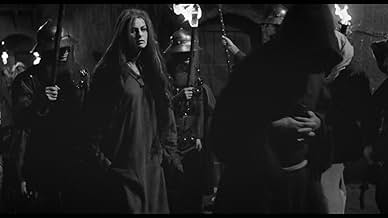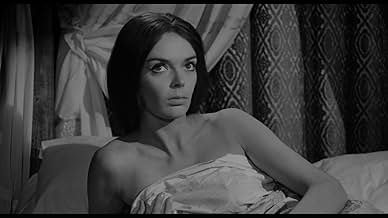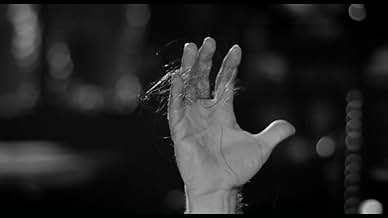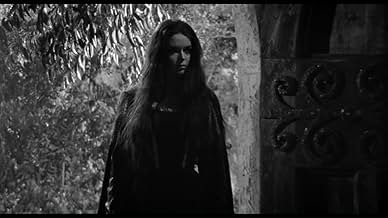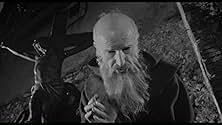VALUTAZIONE IMDb
6,2/10
2015
LA TUA VALUTAZIONE
Aggiungi una trama nella tua linguaA woman under suspicion of witchcraft is burned alive. Her curse brings her back from the dead for revenge.A woman under suspicion of witchcraft is burned alive. Her curse brings her back from the dead for revenge.A woman under suspicion of witchcraft is burned alive. Her curse brings her back from the dead for revenge.
- Regia
- Sceneggiatura
- Star
Umberto Raho
- Von Klage, the Priest
- (as Robert Rains)
Laura Nucci
- Grumalda
- (as Laureen Nuyen)
Giuliano Raffaelli
- Count Humboldt
- (as Jean Rafferty)
Nello Pazzafini
- Monk, the Servant
- (as John Carey)
Aldo Barozzi
- Plague Victim
- (non citato nei titoli originali)
Mario Casella
- Gorca
- (non citato nei titoli originali)
Severino D'Ottavi
- Party Guest
- (non citato nei titoli originali)
Alba Maiolini
- Wife of Plague Victim
- (non citato nei titoli originali)
Aldo Massasso
- The Priest
- (non citato nei titoli originali)
Enzo Mondino
- Villager at the Execution
- (non citato nei titoli originali)
Piero Pastore
- Baron Von Letz
- (non citato nei titoli originali)
Sylvia Sorrente
- Gorca's Wife
- (non citato nei titoli originali)
Terry Velasco
- Gorca's Daughter
- (non citato nei titoli originali)
Recensioni in evidenza
Very disappointing and surely one of Antonio Margheriti's less effective films. The beginning is great and the ending even more so, while Barbara Steele looks fantastic throughout. Its what happens between the start and finish that is of concern. This is a revenge movie where the main protagonist appears not to realise there is a task in hand. Lots of walking along corridors and up and down stairs and stone steps - some admittedly stylishly Gothic with flowing robes and dark shadows. But we seem to be treading water all the time, silently urging Babs to get her act together. Watching Steele go about the castle it is once again so evident that that face can literally convey fear, excitement and terror all at the same time. It is quite uncanny, but sadly not made enough of here.
A woman is burned for being a witch. Her daughter, Helen Karnstein (Barbara Steele) vows revenge, but is pushed off a cliff before she can carry it out. The younger sister, Elizabeth (Halina Zalewska), grows up and is forced to marry the man who framed her mother. Then one stormy night, Helen rises from the grave. Elizabeth's husband immediately falls for Helen and together they plot to get rid of Elizabeth. Will Helen really help kill her sister, or is it part of a plot to finally get revenge for her mother's death?
If you're a fan of either Italian B&W ghost stories or Barbara Steele, there's a lot here to enjoy. There's just something about B&W that seems to work for me in a ghost story. B&W makes Gothic lookwell, more Gothic. Color never works as well for me with this kind of movie. The eerie passageways of the castle, the witch burning scene, and the dead corpses in the burial chamber are especially creepy in The Long Hair of Death. But my favorite scene, filmed in all its B&W glory, has to be Helen's appearance in the chapel after having been brought back from the dead. To quote Martha Stewart, "It's a good thing."
Barbara Steele made a boatload of horror films that I enjoy. In fact, she's in my all time favorite - Black Sunday. I have no way of knowing if this is true, but she appears to be having more fun with her role in The Long Hair of Death than I've noticed in some of her other movies. Regardless, there's no denying how mesmerizing she is here. It's impossible not to focus on her in every scene in which she appears.
I suppose I should give the usual warning to those more accustomed to the pace of modern horror. The Long Hair of Death is slow going. Those who require a killing or an explosion every five minutes should probably just skip it.
If you're a fan of either Italian B&W ghost stories or Barbara Steele, there's a lot here to enjoy. There's just something about B&W that seems to work for me in a ghost story. B&W makes Gothic lookwell, more Gothic. Color never works as well for me with this kind of movie. The eerie passageways of the castle, the witch burning scene, and the dead corpses in the burial chamber are especially creepy in The Long Hair of Death. But my favorite scene, filmed in all its B&W glory, has to be Helen's appearance in the chapel after having been brought back from the dead. To quote Martha Stewart, "It's a good thing."
Barbara Steele made a boatload of horror films that I enjoy. In fact, she's in my all time favorite - Black Sunday. I have no way of knowing if this is true, but she appears to be having more fun with her role in The Long Hair of Death than I've noticed in some of her other movies. Regardless, there's no denying how mesmerizing she is here. It's impossible not to focus on her in every scene in which she appears.
I suppose I should give the usual warning to those more accustomed to the pace of modern horror. The Long Hair of Death is slow going. Those who require a killing or an explosion every five minutes should probably just skip it.
The Long Hair of Death was one of the cycle of Gothic horror films released by Italian studios in the 1960's. Like the majority of them, it was filmed in black and white for budget reasons although from today's perspective this does give the film a certain atmosphere and classy look. Set in the 15th century, a young woman is accused of being a witch and is burned to death. She casts a curse on the house of the men responsible and returns from the grave many years later to enact deadly revenge.
The director here was Antonio Margheriti working under his anglicised moniker Anthony Dawson. Margheriti was a director who made films in most of the Italian genres, from peplums and spaghetti westerns to gialli and poliziotteschi amongst others. He displays some care with the Gothic horror genre taking care to build a moody atmosphere and slowly constructing the story. But the main draw here is probably Barbara Steele. This British actress was the queen of the 60's Gothic horror film, appearing in movies from both sides of the Atlantic although she is primarily associated with the Italian strain of the sub-genre. Her strong, seductive features were perfectly suited to these films and, once again, she is more aggressor than victim here.
This is a fairly typical entry in the Italian Gothic sub-set. It's a solid entry, if not in the upper bracket. It does have some well-staged scenes and nice location photography though and it ends on a satisfyingly macabre note. While it obviously benefits considerably by the presence of Steele. The title doesn't really mean an awful lot but it sounds good.
The director here was Antonio Margheriti working under his anglicised moniker Anthony Dawson. Margheriti was a director who made films in most of the Italian genres, from peplums and spaghetti westerns to gialli and poliziotteschi amongst others. He displays some care with the Gothic horror genre taking care to build a moody atmosphere and slowly constructing the story. But the main draw here is probably Barbara Steele. This British actress was the queen of the 60's Gothic horror film, appearing in movies from both sides of the Atlantic although she is primarily associated with the Italian strain of the sub-genre. Her strong, seductive features were perfectly suited to these films and, once again, she is more aggressor than victim here.
This is a fairly typical entry in the Italian Gothic sub-set. It's a solid entry, if not in the upper bracket. It does have some well-staged scenes and nice location photography though and it ends on a satisfyingly macabre note. While it obviously benefits considerably by the presence of Steele. The title doesn't really mean an awful lot but it sounds good.
Long Hair of Death is a great film. I have to disagree with other reviewers regarding this, both those here on the IMDb and some in printed publications. This is 1960s Italian horror at its very best and, to me, that means it is among the very best, period. I can understand why many in today's impatient, multi-task oriented audience would not like slow moving, atmospheric films which are very dull compared to the current era's action and gore oriented offerings. Films such as these require a cultivated taste of sorts and I realize they are not for everybody.
Long Hair of Death is outstanding because it is exactly what those who do not like it say that it is. It is slow moving, contains little action and there are long periods of -- not much. Not much, except for a feeling of dread and unease that begins immediately after the story begins and does not end until literally the film's end. The slowness is the main reason the viewer sits in uncomfortable agony waiting for something bad to happen, which eventually does.
The story concerns a woman burnt at the stake in 16th century Italy, falsely accused of murder. That she happens to be a count's wife and the count's son the real villain of the story are of great importance in the storyline. Giorgio Ardisson as the evil Kurt Humboldt is one of the big screen's most despicable characters, as throughout the film he commits multiple murder and rape, but sadly most persons not interested in obscure cinema will never know this or experience his splendid performance. The great Barbara Steele (How I wish she had done a greater body of work!) plays a dual role, her characters being pretty much the same as they were in 1960's Black Sunday, (La Maschera del Demonio), as Helen Karnstein, wife of Count Humboldt and also as her daughter Mary. Again, the story is pretty much the same as Black Sunday, with the emphasis being on the executed Helen and the curse she places upon the Count and his son Kurt Humboldt. Daughter Mary, who is a lookalike for her mother, assists in the revenge by playing upon the Count's guilt to destroy him emotionally and getting Kurt to fall in love with her. The fact that Kurt is already married to Mary's sister Elizabeth, herself abused by Kurt, adds dramatically to the sense of moral decay in the Humboldt castle.
The ultimate revenge is as creative as it is brutal. Watch the film to see what it is, I won't provide SPOILERS here.
Barbara Steele remains to this day the standard which all horror (scream) queens are judged, and that is interesting because she does very little screaming and performs little if any violence in her films. She is to horror acting what Alfred Hitchcock was to suspense directing. They frighten you with "What if . . . ," instead of actual brutality and exaggerated acting. From the moment she first appears on screen in any of her films one knows trouble will soon follow and it has nothing to do with anything she says or does. Whatever "it" is, she has it in abundance. Long Hair of Death will remind some viewers of 1972's Lisa and the Devil, (Lisa e il Diavolo) another story of a decaying household but set to modern times. One wonders how much better that film would have been with Ms. Steele in the lead instead of Elke Sommer, a fine actress but out of her depth in psychological horror.
Director Antonio Margheriti has never received the credit he deserves as a fine director of subdued horror. Margheriti will take you on a painstaking walk through the dreariest of castles and make you feel the suspense of every hesitant step and so it is with Long hair of Death. I recently viewed Long Hair of Death after having not seen it in awhile and was emotionally drained by the time the end credits rolled.
If you are unfamiliar with this type of film and are unimpressed with the sensationalism of today's cinema, then find Long Hair of Death or any of the other fine films of Margheriti or Mario Bava. I believe you will be pleasantly surprised and join me in my admiration of Italian horror cinema of this period.
Long Hair of Death is outstanding because it is exactly what those who do not like it say that it is. It is slow moving, contains little action and there are long periods of -- not much. Not much, except for a feeling of dread and unease that begins immediately after the story begins and does not end until literally the film's end. The slowness is the main reason the viewer sits in uncomfortable agony waiting for something bad to happen, which eventually does.
The story concerns a woman burnt at the stake in 16th century Italy, falsely accused of murder. That she happens to be a count's wife and the count's son the real villain of the story are of great importance in the storyline. Giorgio Ardisson as the evil Kurt Humboldt is one of the big screen's most despicable characters, as throughout the film he commits multiple murder and rape, but sadly most persons not interested in obscure cinema will never know this or experience his splendid performance. The great Barbara Steele (How I wish she had done a greater body of work!) plays a dual role, her characters being pretty much the same as they were in 1960's Black Sunday, (La Maschera del Demonio), as Helen Karnstein, wife of Count Humboldt and also as her daughter Mary. Again, the story is pretty much the same as Black Sunday, with the emphasis being on the executed Helen and the curse she places upon the Count and his son Kurt Humboldt. Daughter Mary, who is a lookalike for her mother, assists in the revenge by playing upon the Count's guilt to destroy him emotionally and getting Kurt to fall in love with her. The fact that Kurt is already married to Mary's sister Elizabeth, herself abused by Kurt, adds dramatically to the sense of moral decay in the Humboldt castle.
The ultimate revenge is as creative as it is brutal. Watch the film to see what it is, I won't provide SPOILERS here.
Barbara Steele remains to this day the standard which all horror (scream) queens are judged, and that is interesting because she does very little screaming and performs little if any violence in her films. She is to horror acting what Alfred Hitchcock was to suspense directing. They frighten you with "What if . . . ," instead of actual brutality and exaggerated acting. From the moment she first appears on screen in any of her films one knows trouble will soon follow and it has nothing to do with anything she says or does. Whatever "it" is, she has it in abundance. Long Hair of Death will remind some viewers of 1972's Lisa and the Devil, (Lisa e il Diavolo) another story of a decaying household but set to modern times. One wonders how much better that film would have been with Ms. Steele in the lead instead of Elke Sommer, a fine actress but out of her depth in psychological horror.
Director Antonio Margheriti has never received the credit he deserves as a fine director of subdued horror. Margheriti will take you on a painstaking walk through the dreariest of castles and make you feel the suspense of every hesitant step and so it is with Long hair of Death. I recently viewed Long Hair of Death after having not seen it in awhile and was emotionally drained by the time the end credits rolled.
If you are unfamiliar with this type of film and are unimpressed with the sensationalism of today's cinema, then find Long Hair of Death or any of the other fine films of Margheriti or Mario Bava. I believe you will be pleasantly surprised and join me in my admiration of Italian horror cinema of this period.
After hearing so much about the often ballyhooed Black Sunday film which predates this one I finally got the chance to check out both films for myself. Black Sunday a.k.a the Mask Of Satan is also a Gothic b/w Italian horror film that features Barbara Steele as it's main character. Every review that I came across recommended the Mario Bava movie without any reservations whatsoever and made constant references to it's beautiful cinematography, period detail and atmosphere. I was super anxious to see this unanimously lauded classic. However, once viewed, I did not find the Mask of Satan to be that great of a movie. Yes, it was beautifully filmed and yes it was quite atmospheric but it was also flat, boring and predictable. It's dated violence and special effects did very little to help liven things up. The eerie soundtrack that seemed to constantly be playing was too loud and it actually served to slaughter, in it's infancy, any tension that possibly might have been building. The film felt like a major let down after hearing so much about it. It was o.k. but nearer to a novelty than a classic. The Long Hair Of Death was a film which I had heard absolutely nothing about. I only just learned of it's existence when it was recently scheduled to be released on blu ray in the near future. The cover art was intriguing and there was Barbara Steele again. So I found the movie on YouTube and set out to see if it was worth adding to my collection. Little did I know what a treat I was in for. This movie is similar in look and feel to Bava's film yet it is superior to that film due to it's character development and it's bizarre and intermittent flashes of kinky eroticism. The pacing is glacial in this one also and yet it doesn't feel quite as moribund as "Sunday". The camera work is lovely and lush and is perfectly enhanced by vividly detailed decorative sets and costumes. The acting is better in this one too although the dialog is pretty standard for this type of fare. All in all, I prefer The Long Hair of Death to Black Sunday on any given day and will be purchasing a copy on blu ray ASAP.
Lo sapevi?
- BlooperObvious doll is used to replace the actress at the start of the movie in the burning scene.
- ConnessioniFeatured in Moviedrome: Long Hair of Death (I Lunghi Capelli Della Morte) (1988)
I più visti
Accedi per valutare e creare un elenco di titoli salvati per ottenere consigli personalizzati
- How long is The Long Hair of Death?Powered by Alexa
Dettagli
- Data di uscita
- Paese di origine
- Lingua
- Celebre anche come
- Los largos cabellos de la muerte
- Luoghi delle riprese
- Azienda produttrice
- Vedi altri crediti dell’azienda su IMDbPro
- Tempo di esecuzione1 ora 36 minuti
- Colore
- Proporzioni
- 1.85 : 1
Contribuisci a questa pagina
Suggerisci una modifica o aggiungi i contenuti mancanti

Divario superiore
What is the Spanish language plot outline for I lunghi capelli della morte (1964)?
Rispondi
